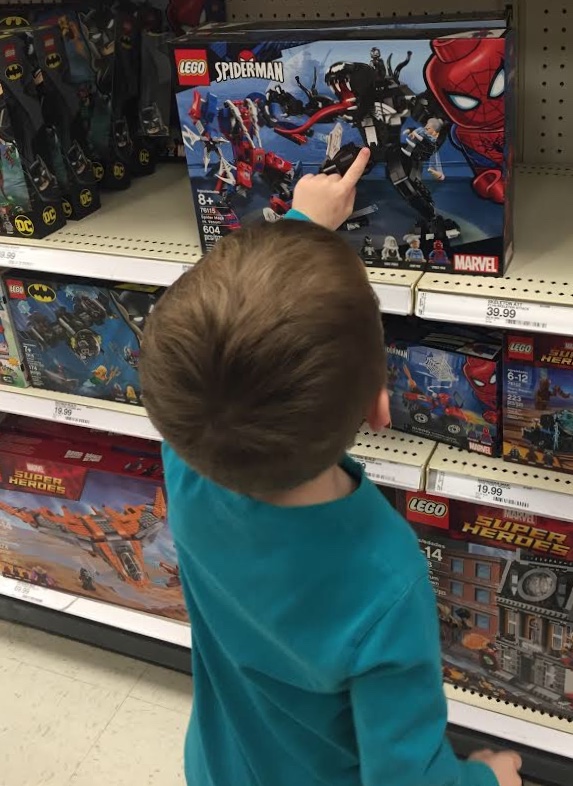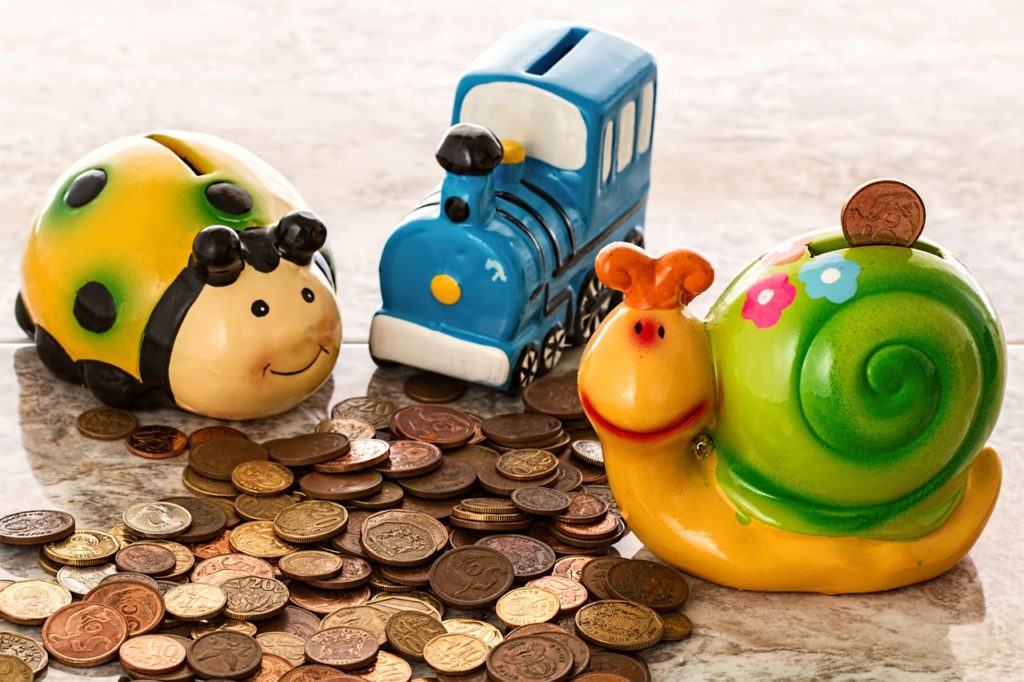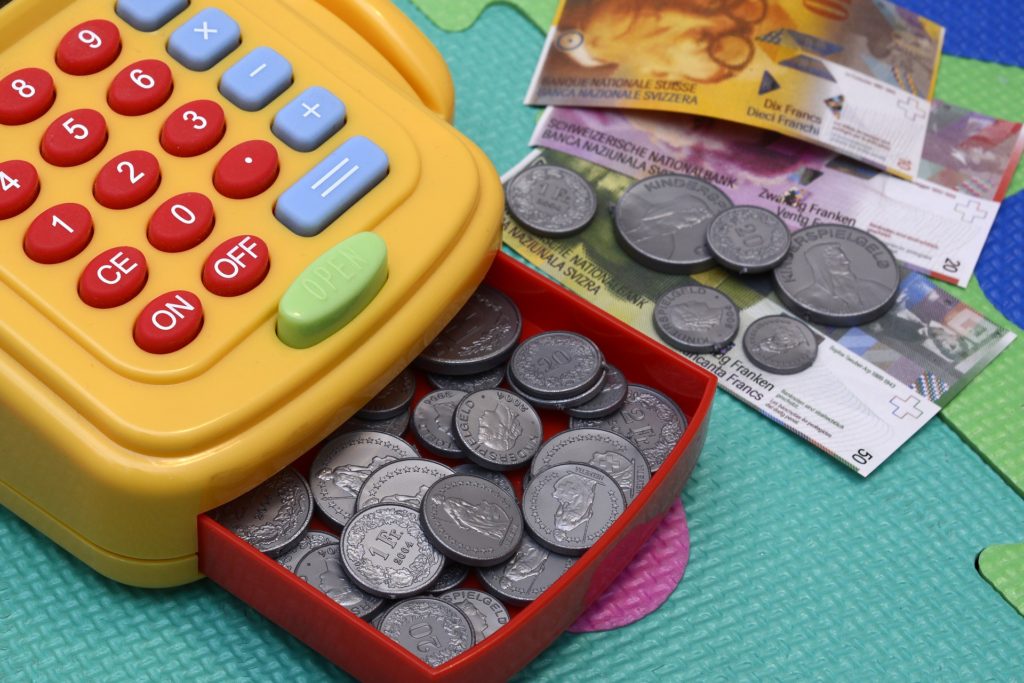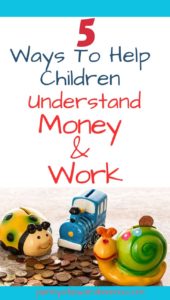Two years ago, when my oldest son was 4, we were standing in line at Target. Like every store, they have all the fun impulse buys as you wait in line right before you get to the register. He saw a small LEGO set that looked like fun, so of course, he asked (begged?) for it.
What followed was a conversation teaching kids about money and work that the lady behind us seemed surprised to hear! Especially since the entire lesson was being taught by a 4 year old!

*Disclosure: Affiliate links are used in this post, earning me a small commission at no additional cost to you if you click through and make a purchase. I only recommend products or services I love and believe you will love too! Thank you for supporting my blog!
Here’s how that conversation went…
“Momma, I love that LEGO set. I really want that! How many dollars does it cost?”
I bend down to see the price is $8.99.
“It’s 9 dollars.”
“9 dollars? You mean I have to earn 9 quarters to buy that?!”
“No, actually, you have to earn 36 quarters.”
“What?! 36 quarters? I do NOT want to work that much!”
The lady behind us laughed loudly, as if that is not at all what she expected to hear coming out of this little guy’s mouth.
But that was it. The end of asking for that LEGO set. No screaming or crying that he couldn’t get something he wanted. He didn’t even bring it up again. He knew that he didn’t have the money, plus it sounded like way too much effort to work that much for something so small.
Obviously, this discussion came about as the result of many conversations we had already had at home regarding money and work.
How do you teach your young children about money and work ethic?
Here are 5 things you can start today to set a basic foundation for money and work, even with very young children.
1) Talk about money—with your spouse and with your kids.
Money in general is such an everyday part of our lives and, therefore, should come up in everyday conversation. Our kids need to know that everything costs money— the house we live in, the food we have on the table, the things we do (fun experiences) that aren’t free—all of it! If you think about it from their perspective, they just think we have these things and they were handed to us, no strings attached. Boy, are they wrong! Ha!
So get that conversation going! Bonus points to you and your spouse for having basic, civil money discussions in front of your kids! By the way, here is how to discuss money with your spouse even when they don’t want to.
Talk about the things you may be giving up now so that you can enjoy something better later. About how you’re getting out of debt so it doesn’t hold you back in the future! About how we can sacrifice things in our own lives so that we can give generously to another.
2) Begin to help your kids understand that money comes from working.
If you work, you get paid. If you don’t work, you don’t get paid. That is the basic principle of money, right?
Your kids can begin to understand this money and work concept even at a very early age. My twins are 3 years old, and they are comprehending this. In fact they earned their first “paycheck” on Valentine’s Day this year. Sure, it was only $1.75 and $3.00, but they were thrilled! And it will form the foundation for what our 6 year old is already putting into place and understanding very easily at this point.
3) Let your kids do some work so they begin to associate money with work.
To help your kids begin to see the correlation of money with work, decide on some things they can do to earn money. We pay in quarters, except the six year old is now getting into some dollar bills too. Start simple. Pick something they are capable of doing, but aren’t doing already. This gives you an incentive to have them help around the house, and also gives them some incentive to do those things.
As soon as they finish the task, pay them. Immediately. It will show them that working and completing the task is what earns them money. My boys each have a piggy bank (the three year olds) and a wallet (the six year old), where they keep their money.
Working tasks for 2 to 3 year old children to earn money
Some ideas for 2 to 3 year olds include: putting things away, like dirty clothes in the laundry basket, shoes where they belong, coats hung up, toys where they belong. They can also throw things in the trash, wipe up messes, and my boys’ favorite: transferring laundry in the washer to the dryer. I also let my twins vacuum our large living area rug with a small kid-sized vacuum.
As a side note, a quarter as payment might seem like way too much for those things, but it’s a great start to begin associating work and money for your child. If you’d like to be more frugal, you could always choose a nickel or dime instead 😉
Working tasks for 4 to 6 year old children to earn money
For 4 to 6 year olds, you can add even more options to the above list. They could sort the toys, make their bed, sort and match socks, put away the clean laundry, give pets food and water, dust, vacuum, set/clear the table, load the dishwasher, etc.
I have been surprised at how capable my boys are to do some basic things. It even makes doing housework much more fun! Yes, it does take a little more time, but I love that they’re learning to work, beginning to learn the value of a dollar, and we’re getting things done together. It’s a win:win!
4) When you first start this process of paying your kids to work, it can be helpful to set a goal for them to earn.
Dollar Tree is a great place to start, especially for a beginner! If they earn 4 quarters, they get to pick one toy at Dollar Tree (yes, you’ll have to cover the tax 😉 That lesson will come later. 
Here’s another idea that we used when my oldest was 4. We bought a couple toys he had wanted and put them on top of the refrigerator with price tags on it. Once he earned that much, he gave us the money and we gave him the toy. Seeing it daily reminded him to do the tasks that earned him money and it brought up the conversation much more often.
5) The last, and probably the most important, of all of these ways to teach your young children about money is to make sure your own financial house is in order.
The neat thing is while you’re teaching your young children about money, it can be a great excuse to improve your own financial situation.
Need a place to start? Check out the Penny Steward Mama Budget Challenge! It’s hosted on Facebook and by email near the end of every month to get your budget set up and ready to go by the 1st of the next month!
Sign up for the budget challenge emails here and join the Penny Steward Mama Facebook Community here!
Now, let’s fast forward two years later from that pivotal conversation in Target. We told our boys (now 3-year old twins, and a 6-year old) ahead of time that we were going to take a special trip to Dallas, stay in a hotel, and — if they could behave — go to LEGOLAND the next day.
Christian, the six year old, immediately started talking about LEGOLAND and asking to do some extra jobs around the house. He wanted to earn money for a nice LEGO building set.
Erick and I wanted to take them for the experience, but Christian had been once before and knew there was a LEGO store at the exit. He knew that if he didn’t save some money, he would leave the store empty-handed, so he was ready to get to work!
We didn’t even prompt him this time. He volunteered to do all kinds of things on his own. He remembered to bring his dirty laundry downstairs every morning to put in the hamper, helped with dishes, vacuumed the stairs (thank goodness he can now help with that task!), cleaned up after himself (and his brothers sometimes), and the list goes on. He earned a small amount of money for each task he completed — usually a quarter to a dollar.
I also enjoyed seeing his three-year old twin brothers join in too. In fact, the day before we left for Dallas, I took them to the bank to get their “paychecks.” Christian earned about $15.00. Cameron had earned $3.00 and Landon, $1.75. It was fun watching them spend their paycheck in Dallas.
Christian added his money to some he had saved in the past and got this awesome LEGO building set.
Cameron and Landon were able to ride the carousel in the food court at Grapevine mall.
Obviously, as our boys get older, many of the above tasks we are currently paying them for, will then be required as responsible members of our household. At that point, doing those things will not result in a “paycheck.” More info on that in a later post 😉 For now, at these younger ages, our goal as parents is to get the point across that when you work, you get paid.
As you can see, children are very capable of learning about money and work ethic, even at a young age. Having general, open conversations about money in your household and with your spouse will begin to make children aware of money, what it is, and how it works.
You can then begin to teach your children where money comes from — work! Once they begin doing “work”, getting paid for it, and buying some small things for themselves, they will begin to understand the value of a dollar.
As you go through this process, use these teaching sessions to improve your own financial situation and make sure your financial house is in order. You will be sure to set a great foundation for your kids’ future as well as your own!
As always, steward your money — and your life — intentionally!
Heather
P.S. Don’t forget to sign up for next month’s BUDGET CHALLENGE!
Join the Penny Steward Mama Facebook community here!
Related resources:

 />
/>



These are some really great tips! I wish I had been taught this stuff as a kid!
I love this! My son is 2.5 and is starting to pay attention to when we are paying for things at the store and knows what coins are. He doesn’t understand the concept of money but does know about chores. I like all these tips for teaching young children how to work for money and will definitely be referring to them over the next few years!